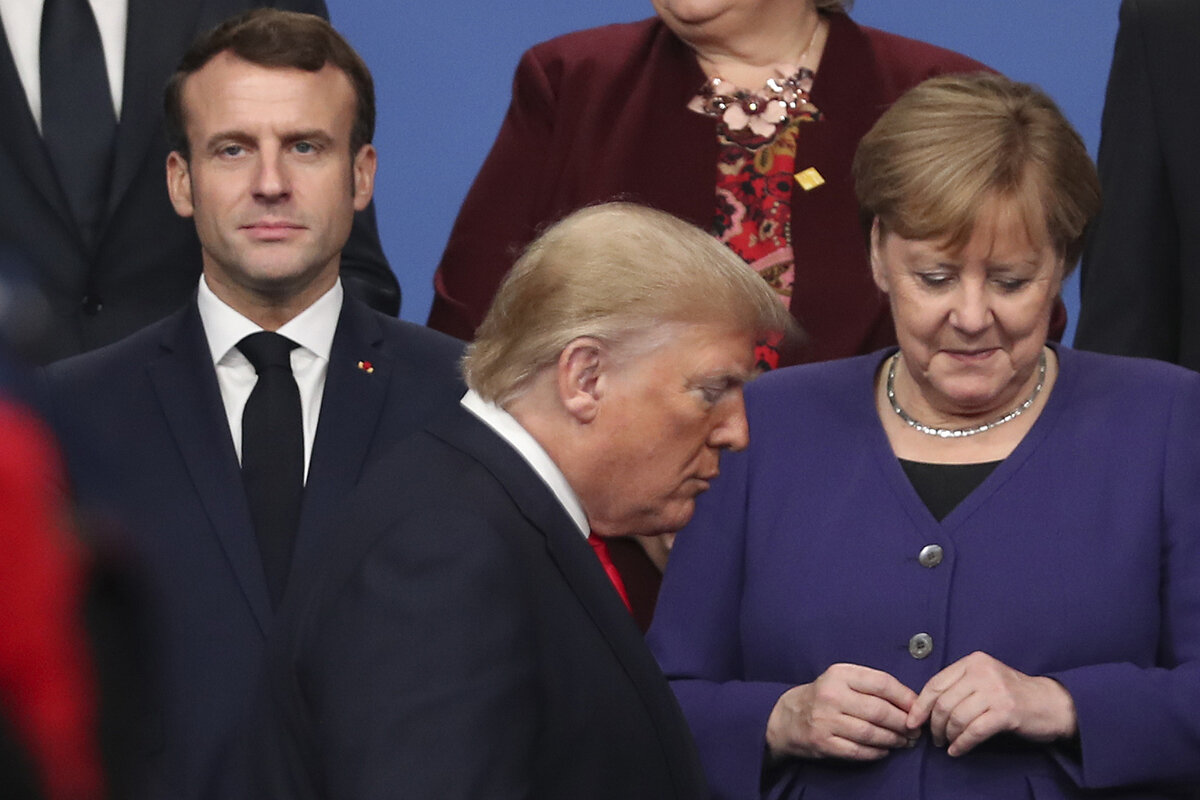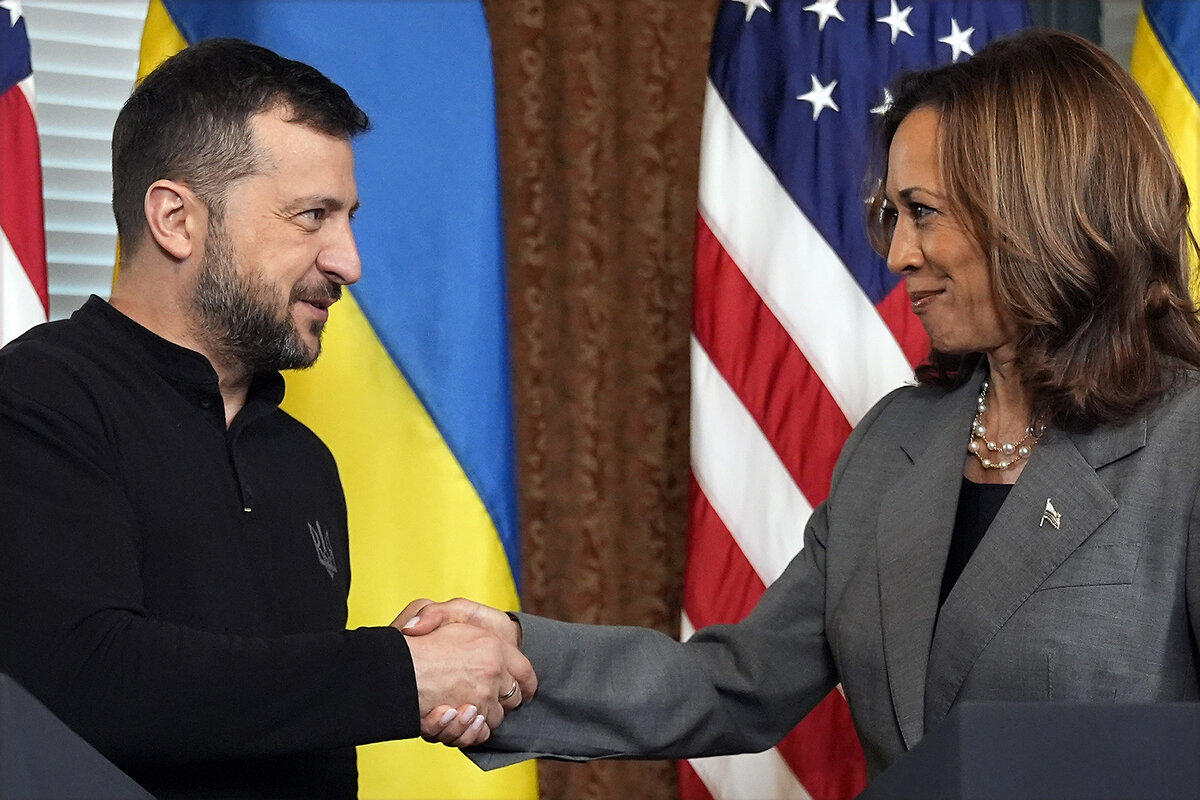The Trump-Harris worldview divide: Fly solo, or with allies?
Loading...
| Washington
In most polls asking voters to list the issues that will influence their choice in next week’s presidential election, foreign policy fares little better than an also-ran.
The economy, immigration, reproductive rights, and threats to democracy come out on top.
Yet at the same time, some surveys, such as the Chicago Council on Global Affairs’ annual gauge of public opinion and foreign policy, show that Americans still want to see the United States play a leadership role in international affairs.
Why We Wrote This
A story focused onU.S. foreign policy may not be a top priority for American voters this year, but it is certainly a concern around the world, much of which is riveted by next week’s election. A key question: how the next U.S. president will treat allies and alliances.
Moreover, some voters suggest that a candidate’s worldview and actions on the world stage provide evidence of his or her character and leadership style, and whether that fits with their own vision of how American leadership should be exercised.
Viewed through that prism, Vice President Kamala Harris and former President Donald Trump appear to offer distinct foreign policy visions that spring from very different worldviews.
In the case of Vice President Harris, a range of foreign policy experts use these words or phrases to describe her worldview: multilateral, cooperation, security through alliances, continuity, or Biden-lite. But words like “nebulous” and “undefined” also pop up.
For former President Trump, the words and phrases these experts say capture his worldview are based on his term in office: unilateral, “America First,” transactional. But “chaotic” and “unpredictable” – even “volatile” and “dangerous” – make a showing.
For many analysts, the biggest difference between the two presidential candidates when it comes to U.S. relations with the world can be boiled down to two words: multilateral and unilateral.
Does America really need its friends?
More broadly, Vice President Harris is seen as a champion of America’s traditional post-World War II role, leading alliances of like-minded democracies – think NATO, the Organization of American States, and the more recent Asia-Pacific Quadrilateral Security Dialogue, or Quad, grouping – and promoting the postwar liberal world order.
President Trump, on the other hand, established a record of disdain for America’s alliances. He is seen as more comfortable with the idea of the U.S. defending its own interests in an era of rising big-power competition.
“We don’t know for sure, but my guess is that Harris is likelier to be open to investing American assets and treasure if you can get allies and international institutions to go along,” says Kori Schake, director of foreign and defense policy studies at the conservative American Enterprise Institute (AEI) in Washington.
“Trump is more likely to be comfortable with unilateral action,” she adds, “while Harris would be unwilling to take a position that no one else would align with.”
Beneath the unilateral vs. multilateral question lie differing views of the costs and benefits of maintaining Washington’s global leadership role.
“Americans got used to hearing that our military actions in Somalia or Iraq or Libya were part of our global leadership,” says Paul Saunders, president of the Center for the National Interest in Washington. But Mr. Trump has tapped into a growing sense among Americans that the costs of that leadership are increasingly outweighing the benefits, he suggests.
Weighing the costs and benefits of U.S. leadership
Vice President Harris would adhere to a more conventional foreign policy and leadership style, consulting both her aides and foreign allies, says Mr. Saunders. Mr. Trump, he predicts, would rely more on his own instincts, and his ambition to “close the deal,” even though “his record is very mixed when it comes to foreign policy.”
His quick report card for President Trump: success in clinching the Abraham Accords that normalized relations between Israel and a number of Arab countries, and success with a modest rewrite and update of the North American trade deal, then called NAFTA.
“But there was no ‘big deal’ with Russia, or North Korea, or Iran,” Mr. Saunders adds, “nor was there any deal with Beijing that the Chinese stuck to.”
As a vice president, Ms. Harris has not been free to hew her own foreign policy path. She would be most likely to differentiate herself from President Biden in relations with Israel, showing a willingness to stand up sooner and more publicly to Prime Minister Benjamin Netanyahu, some experts say.
The clearest differences between the two presidential candidates, though, are likely to emerge over Ukraine. Candidate Ms. Harris has framed Russia’s invasion of Ukraine in the same terms as the Biden administration, calling it a violation of international law and a threat to European security and democracy. She has echoed President Biden’s vow of “support as long as it takes.”
Mr. Trump, on the other hand, has insisted he could end the war in a day, drawing in part on his relationship with Russian President Vladimir Putin.
While the former president has offered no details of how he would conclude a peace accord, some former aides say his deal would mean significant territorial concessions by Ukraine – with little concern for how such a solution would go over with European allies.
“Harris would continue with the establishment consensus on supporting [Ukrainian President Volodymyr] Zelenskyy and the Ukrainians,” says Michael Desch, director of the Notre Dame International Security Center in Indiana.
“But Trump is a different story. He’s not committed to helping Ukraine, we already know he’s a NATO skeptic,” he adds, “and he thinks he can do business with Vladimir Putin.”
Is Trump better in tune with today’s world?
There are good reasons to doubt the likelihood of a magic formula quickly ending Russia’s war in Ukraine, Dr. Desch says. But at the same time he suggests that much about Mr. Trump’s approach to foreign policy may fit better than Ms. Harris’ approach with today’s world.
“So much of the establishment fixation with American leadership is nostalgia for the unipolar moment that is past,” he says. On the other hand, he sees Mr. Trump as more comfortable with a world that is “more like late 19th century Europe.”
“America is still a great power,” he adds, “but there are other great powers out there, including China and Russia, that have to be taken account of.”
Ms. Schake, the AEI’s foreign policy expert, says no one should doubt that the United States needs a strong leader to pursue core national interests in a world that remains highly interdependent. But she is concerned by the authoritarian tone of some of Mr. Trump’s remarks.
“So many of my fellow Republicans who are reluctantly aligning with Trump acknowledge that things he is saying are terrible,” she says. “But they say, ‘Look at what he does, don’t listen to what he says.’”
In response, she says she tells them, “You would always say that we should take Putin and [Chinese leader] Xi Jinping at their word. So how is it wise to ignore the words of Donald Trump?”








